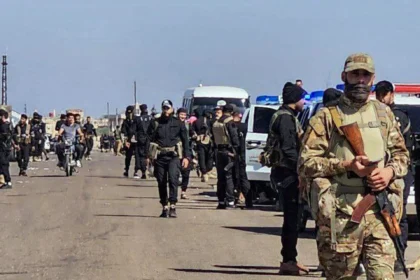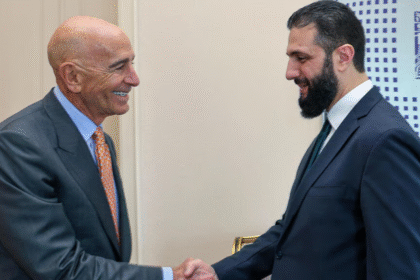India Demands Global Rollout of ‘Operation Sindoor’: 7 Urgent Actions from 2025 South Africa Summit
Johannesburg, South Africa | June 2025
In a bold assertion of India’s stance against terrorism, a high-powered, all-party Indian Parliamentary delegation, led by Lok Sabha MP and senior NCP-SCP leader Supriya Sule, launched a global appeal from Johannesburg, South Africa. The central theme of this diplomatic outreach: internationalising Operation Sindoor, India’s emerging doctrine of calibrated counterterrorism response, and building an unwavering global consensus against cross-border terrorism.
Speaking at a vibrant community interaction with the Indian diaspora in Johannesburg on May 27, Sule stressed that Prime Minister Narendra Modi’s vision extends far beyond India’s borders. “It was PM Modi’s wish that Operation Sindoor must not remain limited to the borders of India and Pakistan,” she said. “It must reach the global stage. It must carry forward the message that India will never tolerate terrorism, and we will always stand for peace—without sacrificing innocent lives.”
Operation Sindoor: A Message Beyond Borders
The delegation’s message was rooted in the grief and outrage following the Pahalgam terrorist attack, which claimed the lives of 26 Indian citizens. The massacre, reportedly orchestrated by The Resistance Front (TRF), a proxy of Lashkar-e-Taiba, has once again exposed the enduring threat of cross-border terrorism, and in particular, Pakistan’s continued use of terror as state policy.
Supriya Sule invoked a decade-long timeline of Indian outreach and patience. “When Prime Minister Modi took office in 2014, he extended an olive branch. Every head of government from neighbouring countries was invited to the swearing-in ceremony. It was a symbol of goodwill—India was extending its hand in friendship,” she recalled. “But the Pahalgam attack shattered that hope. It was not just an attack on people—it was an attack on India’s soul.”
The NCP-SCP leader’s remarks struck a chord with the audience, composed of business leaders, professionals, students, and Indian-origin South Africans. She underlined that India’s response, through Operation Sindoor, was not driven by vengeance, but by principle—peace, dignity, and justice.
“Terrorism Will Not Be Tolerated”: Thakur’s Sharp Rebuke to Pakistan
Joining her in this united voice was BJP MP Anurag Singh Thakur, who described Pakistan as a habitual violator of international norms. Thakur highlighted the targeted retaliatory strikes on nine terror camps, allegedly launched by Indian forces in response to Pakistan’s inaction after the Pahalgam massacre.
“For 15 days after the attack, Pakistan did not act. So, India acted. Our armed forces hit nine terror sites. Even the terrorists confessed—entire families were lost. One said, ‘I wish I had died instead,’” Thakur stated. “Pakistan is the only country with 52 individuals and entities listed by the United Nations Security Council for terrorist affiliations. All are connected to Pakistan.”
He continued, “In Pahalgam, victims were singled out based on religion. They were executed in front of their children and wives. That’s not just terror—that’s barbarism. And the world must respond.”
Manish Tewari: “Terrorism is Pure Evil”
Congress MP Manish Tewari brought a cross-party perspective, describing terrorism as “a pure evil that must be exorcised from the body politic of this globe.” Recalling the loss of 26 innocent civilians, Tewari noted that India has long sought to build international pressure on nations that weaponise terrorism.
“Terrorism has no religion, no justification, and no moral ground. After Pahalgam, we are intensifying our diplomatic efforts to generate a global consensus against countries that use terrorism as state policy,” he said.
Tewari’s comments built on his long-standing position that India must hold sponsors of terrorism accountable not just through military means but through international law and diplomatic isolation. “For 45 years, Pakistan has used terror as a tool against India and the region. India wants peace, but not peace at the price of its people’s blood.”
The Indian Parliamentary delegation’s message to the international community was unmistakably clear: Operation Sindoor represents a fundamental evolution in India’s counterterrorism doctrine. Far from being a rash response, the operation was carefully executed with calibrated precision, designed to dismantle terrorist infrastructure without endangering civilian lives or escalating into a broader regional conflict.
The delegation emphasised this during their diplomatic meetings and community engagements in Johannesburg. Operation Sindoor, according to Indian officials, struck nine terror camps located across the Line of Control in what is being described as the most significant post-Pulwama retaliation yet. Unlike earlier cross-border actions, Operation Sindoor is not being seen as a standalone mission—it is being pitched as the foundation for a codified Indian response framework to terrorism, to be legitimised and promoted at the global level.
According to members of the delegation, the core principles of Operation Sindoor include:
- Zero tolerance for terrorism, irrespective of its geographic or ideological origins.
- Proportional response to targeted threats, based on precise intelligence.
- Minimised collateral damage, avoiding harm to civilian populations.
- Transparency in communication, sharing the scope and necessity of operations with key allies and international forums.
This framework, they asserted, must now become a model for collective international action.
Syed Akbaruddin: From the UN to Johannesburg – A Strategic Voice
One of the most respected voices in Indian diplomacy, Syed Akbaruddin, India’s former Permanent Representative to the United Nations and a member of the current delegation, took a leading role in shaping the message of universal accountability. Speaking to both the South African authorities and Indian community leaders, Akbaruddin drew attention to the dangerous global precedent being set by the selective silence on terrorism.
“When state actors and multilateral platforms differentiate between ‘good’ and ‘bad’ terrorists, they embolden groups like Lashkar-e-Taiba and Jaish-e-Mohammed. The world cannot afford this ambiguity any longer,” he stated. “India is showing the way through Operation Sindoor. We want this model—of strategic restraint and calibrated retaliation—to become part of the global counterterrorism vocabulary.”
Akbaruddin further reiterated the importance of collective security in the Global South. With Africa increasingly exposed to extremist ideologies, particularly in the Sahel and Horn of Africa, India’s experience is highly relevant. “Africa and Asia must lead this conversation together. The consequences of inaction will not be limited to our borders.”

Indian Delegation’s Strategic Messaging: No More Terrorism Exceptionalism
Over the course of the delegation’s engagements, including with South African parliamentarians, cabinet ministers, and civic groups, the message was resolute—terrorism is a global disease, and its enablers must face universal condemnation and action.
The Indian delegation made the following key assertions during formal meetings:
- No differentiation between terror groups based on geography, target, or ideology—terrorism is terrorism.
- Sanctuary states—countries that provide safe havens, logistical support, or ideological patronage—must face international sanctions.
- The global architecture must establish a mandatory framework for intelligence sharing, counter-radicalisation, and cross-border enforcement.
- The UN Security Council’s terror listings must be depoliticised and made binding.
- Funding pipelines of terror groups must be cut through international cooperation on financial regulation and FATF enforcement.
V Muraleedharan, former Minister of State for External Affairs, remarked: “India is not just reacting to terror—it is building a new world order where terror is not tolerated, explained, or excused. We hope our South African partners and African Union members will amplify this vision.”
Cross-Party Solidarity Strengthens India’s Global Pitch
What set this visit apart was not just its diplomatic focus, but the unprecedented bipartisan unity it displayed. Political differences were set aside in favour of a unified national interest—protecting India’s sovereignty and standing against terror.
The delegation included senior leaders from across India’s political spectrum:
- Supriya Sule (NCP-SCP) – Head of the delegation, Lok Sabha MP
- Anurag Singh Thakur (BJP) – Senior BJP MP and former Union Minister
- Manish Tewari (Congress) – Former Union Minister for I&B and Defence spokesperson
- Anand Sharma (Congress) – Former Union Minister of Commerce and Industry
- Rajiv Pratap Rudy (BJP) – Senior MP and former Union Minister
- Lavu Sri Krishna Devarayalu (YSRCP) – Parliamentarian from Andhra Pradesh
- Vikramjeet Singh Sahney (AAP) – Rajya Sabha MP and industrialist
- V Muraleedharan (BJP) – Former Minister of State for External Affairs
- Syed Akbaruddin – Former Indian envoy to the UN
The presence of these leaders, representing ideological spectrums from right-wing nationalism to centrist liberalism, lent moral and political credibility to the Indian position.
As the Indian parliamentary delegation transitioned from community outreach in Johannesburg to high-level governmental engagements in Cape Town, the focus shifted to strategic cooperation between India and South Africa—and more broadly, India and the African Union—on global counterterrorism frameworks. This move was seen not just as a diplomatic initiative but as the emergence of a Southern coalition against global terrorism.
South African officials welcomed the Indian proposal to jointly pursue a “Global South Anti-Terror Initiative”, aimed at creating a multilateral forum for:
- Information and intelligence exchange between Asian and African security agencies.
- Coordinated UN General Assembly-level resolutions that criminalise state-backed terrorism.
- A shared framework to monitor and dismantle terror financing networks.
- Establishing counter-radicalisation programs in schools, community spaces, and social media.
South Africa’s Ministry of International Relations and Cooperation expressed deep solidarity with India, condemning the Pahalgam attack and calling for firm global measures. Ministerial-level conversations in Cape Town saw South African officials agree to bilateral security dialogues focused specifically on terrorism, something previously limited to broader diplomatic talks.
An African diplomat close to the discussions stated:
“Africa knows the price of radical violence—whether it is Boko Haram in Nigeria, al-Shabaab in Somalia, or ISIS-affiliates in the Sahel. What India is proposing is not just relevant—it’s urgent.”
From Johannesburg to Cape Town: India’s Parliamentary Diplomacy in Action
On Wednesday, June 4, the Indian delegation arrived in Cape Town to hold key meetings with members of the South African Parliament, including the Joint Standing Committee on Defence, the Portfolio Committee on International Relations and Cooperation, and senior ministers from the cabinet. According to Indian officials, these engagements were designed to do two things:
- Secure moral and political support for India’s counterterrorism doctrine, especially the underlying principles of Operation Sindoor.
- Position India as a leader of the Global South in setting the agenda for future anti-terror policies at forums like BRICS, G20, and the United Nations.
During the closed-door meetings, the Indian MPs provided detailed intelligence-backed briefings on Pakistan’s role in sustaining terrorist groups operating across the LoC. Syed Akbaruddin made a strong case for UN reforms, calling for a system that punishes state complicity in terrorism and not just the non-state actors carrying out attacks.
He urged South Africa to use its voice within the African Union and the G77 to demand enforcement of existing UNSC sanctions and closure of safe havens used by terror groups.
Supriya Sule, head of the Indian delegation, stressed that this was not a partisan Indian concern, but a universal humanitarian crisis:
“Pahalgam wasn’t just a terror attack; it was a slaughter of humanity. When children watch their parents shot dead, when pilgrims are targeted for their faith, the silence of the global community becomes complicity.”
India’s Diaspora Diplomacy: Mobilising Global Indians Against Terror
An important facet of the delegation’s visit to South Africa was its active engagement with the Indian diaspora, especially in Johannesburg and Cape Town. With more than 1.4 million persons of Indian origin, South Africa holds the largest Indian diaspora population on the African continent.
The delegation hosted two community interactions, one of which was attended by over 3,000 Indian-origin South Africans, including teachers, students, industrialists, temple trustees, and former parliamentarians. These events were not merely symbolic—they were strategic, aimed at:
- Mobilising diaspora voices to pressure global governments into taking firmer anti-terror stances.
- Encouraging diaspora media to carry India’s narrative in their local environments.
- Raising awareness of how cross-border terrorism in South Asia is a global threat, not a regional one.
V Muraleedharan stated:
“We want every Indian voice abroad to be India’s voice against terror. Operation Sindoor should not be confined to battlefields—it must echo in every Parliament, every university, every newsroom.”
Operation Sindoor: A Doctrine Beyond Borders
Across all platforms, the Indian delegation reiterated that Operation Sindoor must not remain a singular military response. Instead, it should evolve into an international doctrine grounded in ethics, intelligence, and strategic clarity.
The delegation shared several proposals for how the doctrine could be adopted and expanded globally:
- Operation Sindoor Declaration: A UN-backed resolution condemning all acts of terror that are supported by states, calling for uniform accountability.
- Terror Infrastructure Index: A live database categorising terror camps, known safe havens, radical networks, and financial pipelines worldwide.
- Joint Special Operations Framework (JSOF): A proposed multinational counterterror task force under BRICS or G20, to be deployed in high-risk zones.
- Digital Surveillance Cooperation: A shared technological alliance among like-minded nations to monitor terror recruitment online and disrupt propaganda.
- Humanitarian Corridor Strategy: A plan to protect civilians in terror-affected zones while enabling swift and lawful military responses.
Global Resonance: What Comes Next
Following the Indian delegation’s outreach in South Africa, diplomatic signals suggest positive traction among BRICS and African Union members. Preliminary discussions are expected to continue during the upcoming BRICS Counterterrorism Working Group Summit, slated for July 2025 in New Delhi, where India is expected to table a white paper titled:
“Operation Sindoor and Beyond: A Global Southern Strategy for Counterterrorism.”
Additionally, sources confirm that India has submitted formal proposals to the UN Office of Counter-Terrorism (UNOCT) and is seeking African co-sponsorship for a new General Assembly resolution that codifies global sanctions on state-sheltered terror groups.
Also Read : Over 4 Million Flee Sudan Since War Began, Says UN — Humanitarian Crisis Deepens in 2025








